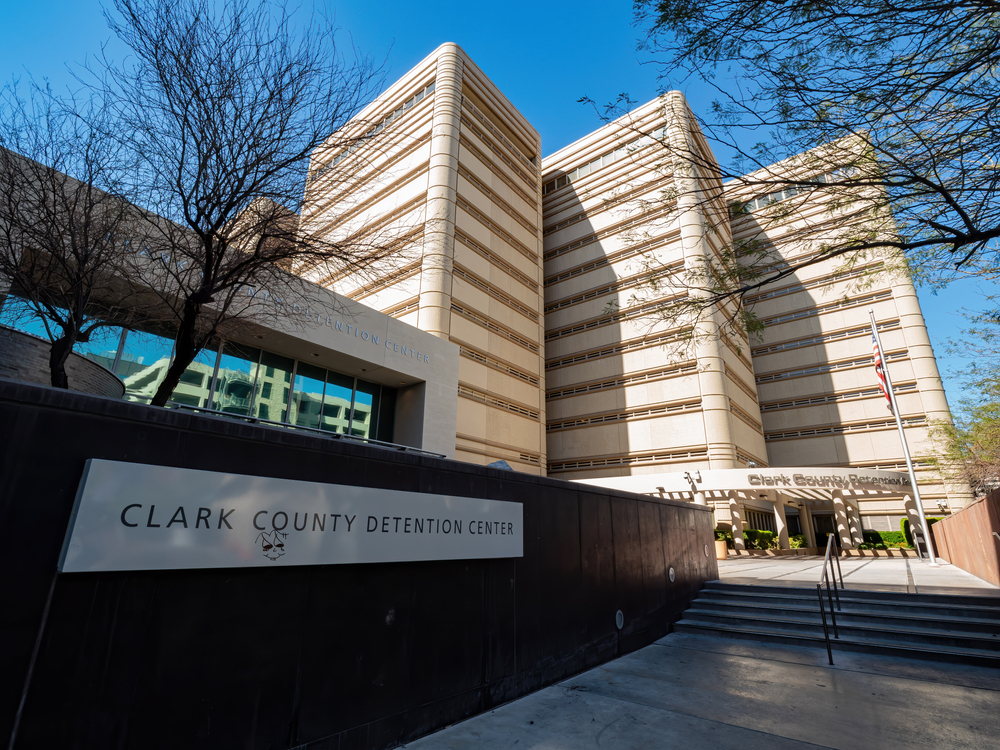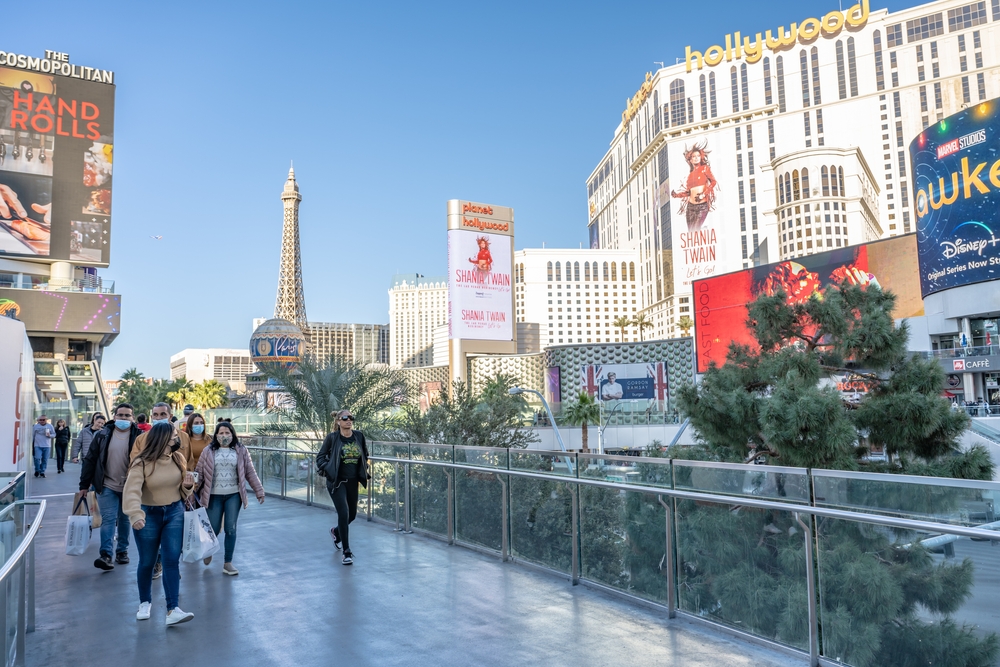ACLU vows to sue to block ‘disorder-related’ ordinance
By Dana Gentry, Nevada Current
This piece was originally published in the Nevada Current.
Catching a glimpse of the Las Vegas Grand Prix from a pedestrian bridge on Las Vegas Boulevard, or stopping to get directions or snap a selfie will now be illegal, following a unanimous vote Tuesday by the Clark County Commission.
Calls to police for “disorder-related” events on the Strip increased 23% between 2018 and 2022, according to a study from UNLV criminal justice professor William Sousa, who says such calls are disproportionately concentrated on the bridges.
“While the bridges comprise less than 6% of the sidewalk system along Las Vegas Boulevard, 11% of disorder-related calls occurred on the overpasses,” Sousa’s study says.
Sousa’s study defines “disorder” as a “broad range of conditions and behaviors that are not necessarily illegal (although they often are), but are nevertheless considered to be problematic in public places.”
“A number of disorders are common on the Las Vegas Boulevard South/Resort District sidewalk system, including aggressive panhandlers, solicitation while intoxicated, aggressive street performers, illegal vendors, confidence games (i.e., three-card monte), and drug related activity,” the study says. “These are all disorders that, as discussed above, can potentially lead to more significant problems if they are not managed.”
“You haven’t heard any specificity with respect to what that crime looks like,” ACLU of Nevada executive director Athar Haseebullah said of Sousa’s assertion that disorderly conduct is increasing, adding the ACLU intends to file a lawsuit against the county. The county contends the ordinance is narrowly tailored and the least restrictive solution, while still protecting First Amendment rights.
Las Vegas Metropolitan Police Undersheriff Andy Walsh said the concealed nature of the bridges pose a challenge for law enforcement to know what’s going on overhead and affects visitors’ perception of personal safety.
“And for some time we have been concerned about crowd crush with the ever-growing number of tourists and large events that occur on Las Vegas Boulevard. We’ve seen large crowds on bridges during major events,” Walsh said, adding a shooting or other emergency could send crowds scrambling across the congested bridges.
Offenders of the new ordinance could be cited and fined or sentenced to jail, however, Walsh said Metro would use discretion in enforcing the ordinance.
Metro’s strategy amounts to selection prosecution, said Eve Hanan, an associate professor at UNLV’s Boyd School of Law.
“They (police) have in mind, and this commission, they have in mind who ought to be prosecuted under this,” Hanan told commissioners. “So it’s a law not meant for equal enforcement.”
“This is not a First Amendment argument. It’s a due process argument with clear Supreme Court case law…” Hanan told the commission. She said the ordinance “takes an issue which is essentially an urban planning and a crowd control issue which is pedestrian flow, and makes it into a criminal matter carrying up to six months in jail.”
Hanan said the ordinance would plunge “working class people who have fallen through the cracks” and may have minor legal problems, such as not having a business license, deeper into trouble, resulting in detention and job loss.
The resort industry and law enforcement have long grappled with how to deal with street performers – members of the public who perform on the sidewalks, usually on the Strip or on Fremont Street in downtown Las Vegas, where performers are required to register with the city.
“The bridges were designed to convey pedestrians from one side to the other and for no other purpose,” Nevada Resort Association president Virginia Valentine told commissioners, adding that pedestrians seeking to cross the Strip have no choice but to use the bridges. “Please consider this ordinance an ounce of prevention, one that may prevent significant injury should there be a need for rapid evacuation across a bridge or access by first responders.”
In 2018, Brandon Summers, a violinist and educator, was told by a Metro officer to leave a skybridge on the Strip, where he was packing up after playing violin. Summers says he complied. When he began taking video of Metro engaging a man selling bottled water on the street, police confiscated Summers’ phone and took both men to jail. Summers was charged with obstructing the sidewalk. The charge was eventually dropped.
In Clark County, street performance is viewed as a “permitted obstructive use.”
Summers sued and Metro eventually paid $100,000 for violating his civil rights.
“I’m confident that the ACLU will do everything in their power to make Clark County regret their decision,” Summers said Tuesday after learning of the ordinance’s approval.
In 2016, a law championed by then-Mayor of New York Bill de Blasio and passed unanimously by the city council prohibited street performers and costumed characters from performing in pedestrian flow zones in Times Square.
“We need to make sure that there is data that’s kept by our law enforcement officers to ensure that is not being applied in an inequitable manner,” Commissioner William McCurdy said, adding that he expects a street performer and a showgirl to “have the same type of interaction with law enforcement.”
The law is expected to go into effect on Jan. 17.
Note: Clark County sent out a statement Tuesday evening saying the ordinance “…is not interpreted to mean that tourists and locals cannot take photos along the Boulevard while on a pedestrian bridge, but rather is intended to maintain the safe and continuous movement of pedestrians on the bridges to ensure pedestrian safety on the bridges.”
A spokesperson did not respond when asked to provide language in the ordinance that exempts taking photos.
LV council adopts ‘order out corridor’ ordinance; ACLU warns it will be challenged

